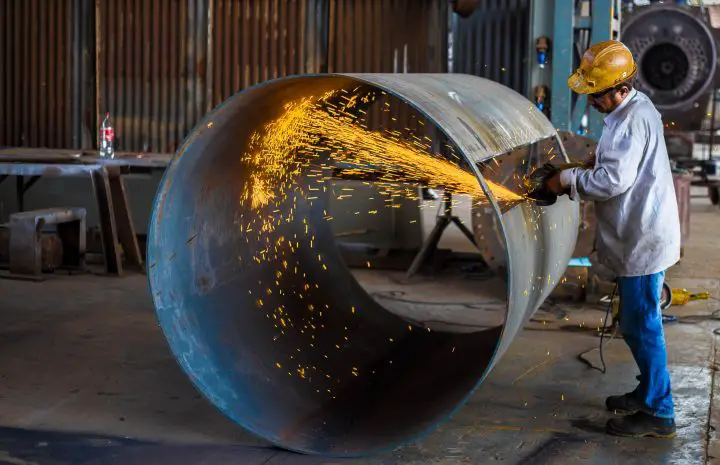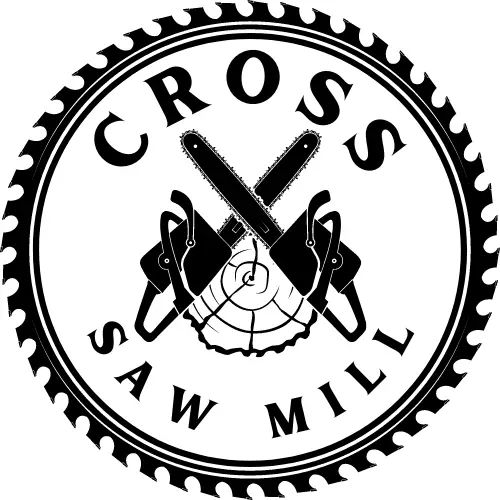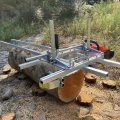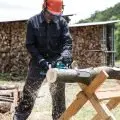A chainsaw is much more than just a tool for cutting trees, wood, lumber, and timber, as many people believe. A chainsaw can cut through metal, that much is true. Chainsaws are versatile tools that can be applied in a variety of circumstances.
But you shouldn’t just get any old chainsaw off the shelf at your neighborhood hardware shop. You should check the type of chainsaw you are using as well as the metal’s thickness.
In this article, we’ll discuss whether can chainsaws cut through metal, along with presenting critical information on the types of chainsaws and how to use a chainsaw for metal.
Table of Contents
- Can Chainsaws Cut Through Metal?
- Metal Cutting Chainsaw: Homeowner vs Professional Chainsaws
- How to Use a Chainsaw to Cut Metal
- The Dangers of Using a Chainsaw to Cut Metal
- Using a Chainsaw for Metal Safety Tips
- FAQs (Frequently Asked Questions)

Can Chainsaws Cut Through Metal?
Metals are chopped by chainsaws, yes. There are metal-cutting blades on every type of chainsaw. These chainsaws do, however, have several drawbacks and shortcomings. It is the metal’s thickness in this instance. Cutting thin metal versus cutting thick metal is very different when using a chainsaw.
It won’t be challenging to cut tin with a chainsaw. Tin is not one of the hardest metals, and with only your hands, you can easily bend it. Therefore, if you try to chop it down with a chainsaw, it will quickly cut and rip apart.
Now picture a steel pipe made of heavy metal. To cut it down, you’ll need a good chainsaw. Metal can be cut with these chainsaws, although sparks and smoke will result. Typically, a spark happens when two pieces of metal touch. So, if utilizing chainsaws is new to you, don’t worry or be afraid.
In the end, a chainsaw’s ability to cut through a piece of metal depends on the type and thickness of the metal. A strong chainsaw with a metal-reinforced chain or a chain with a carbide tip is advised when working with thick metal.
Metal Cutting Chainsaw: Homeowner vs Professional Chainsaws
A typical hand-held chainsaw is not designed to cut through metal. In general, a home-use regular chainsaw lacks the power needed to cut through metal. The only purpose for it is to cut wood.
However, industrial chainsaw blades, which are used to cut metal, are made of special materials. Think about using a circular saw with a metal-cutting blade or a reciprocating saw instead of a chain saw for metal cutting.
A commercial chainsaw is one that can cut through metal. They are the chainsaws that can cut through metal with the greatest efficiency, particularly in the construction sector, particularly for large-scale jobs.
Chainsaws are intended to be fairly loud since they run on petroleum. The chain on these blades is appropriate for the task. They work great for metal-cutting tasks like getting rid of metal nails and other metals.
Homeowner Chainsaws
The typical chainsaw used by homeowners is not made to cut through metal. With this kind of chainsaw, you may prune, make firewood, and cut down smaller trees. Although they are not intended to, household chainsaws may be able to cut through metal. A chainsaw will very certainly cut straight through a nail if you use one to chop wood and you hit it. But the cost of the metal-on-metal contact is on you.
A typical chainsaw’s impact with a piece of metal quickly dulls the chain and leads it to chip or completely break. The process of having the blades honed takes time.
Professional Chainsaws
For use in cutting steel and iron during engineering projects, industrial chainsaws were developed. These goods should only be used by those who are qualified and experienced. These chainsaws were created for jobs that required a lot of effort. Additionally, these have blades that last a very long time.
Professional chainsaws have very powerful motors, which make them ideal for cutting metal. They have blades with teeth that have robust and durable metallic reinforcing. If you use these tools to cut metals, you won’t have to be concerned about the teeth becoming blunted.
You could use a chain sharpening after a few runs, but they are less common than with chainsaws of the same quality used at home. Professional chainsaws also feature teeth that are stronger. As a result, they are less susceptible while cutting through metals. Therefore, a professional chainsaw is the right tool for cutting metal.
Overall, both chainsaws are capable of cutting metal, but the best choice is a professional chainsaw. Chainsaws should only be used by people who have been adequately taught and have expertise since they are dangerous to use.
How to Use a Chainsaw to Cut Metal
It’s time to start showing you how to use a chainsaw to cut metal. Follow this simple process:
1. Chainsaw Preparation
We are all familiar with how to cut metal with a chainsaw. A chainsaw designed for cutting wood is not advised for use while cutting metal. For this, a strong chainsaw is required. Once you have one, you must replace the chain so that it fits the chainsaw bar size.
Additionally, the chainsaw must be inspected. Refill the reservoir if you see that the chainsaw’s bar oil is running low. Check the fuel level too. After all this, you’re finally prepared to begin sawing!
2. Using a Chainsaw to Cut
In the bench vise, place the material you wish to cut. By doing this, you’ll get the necessary grip to maintain the position of the metal. You can control the chainsaw with both hands because chainsaws frequently recoil. Your chainsaw’s engine can now be started. Place it against the material and apply downward pressure from the bottom. Continue until the metal cuts off.
It’s really as easy as that!
The Dangers of Using a Chainsaw to Cut Metal
- Chain break
- Engine damage
- Dull chain
- Kickback
- Sparks
- Spewing metal chips
Now is the time to briefly discuss some of the risks associated with using a homeowner’s chainsaw to cut metal. This chainsaw is used to cut wood not metal. The following list of the top six risks includes:
Chain Break
Chainsaws are dangerous pieces of equipment, as any skilled user is aware. By attempting to use your chainsaw for a task it was not intended for, you run the risk of breaking it. It is understandable why a propelled sharp object should be avoided because it could cause harm.
Chainsaw Engine Damage
Since it takes time to fix a broken chainsaw engine, this is an issue. Repairing these damaged engines is challenging. You must now purchase a new engine. As a result of using your chainsaw to cut through metal, you now have to pay to have the engine repaired.
Dull Chain
Your chainsaw chain may get dull if it comes into contact with metal. A dull chainsaw blade will cause other saw parts, such as the carbide tipped chain, clutch, and engine, to deteriorate. These parts would have to work harder as a result of the dull blade. Chainsaw chains must be resharpened frequently since they quickly grow dull.
Learn about sharpening chains in our How to Sharpen a Chainsaw Chain & How Long Do Chainsaw Chains Last guides!
Chainsaw Kickback
Chainsaw kickback refers to a chainsaw’s abrupt upward jolt. It is risky and one of the major factors in chainsaw mishaps. When the chain gets snagged, it is the most frequent reason for kickback. If the chainsaw is more jammed, the kickback will be more severe. Be wary!
Sparks
Sparks are produced when metals are in contact, as anyone who has witnessed a welder can attest. Sparks are incredibly hot, and depending on your surroundings, you could start a fire or even burn yourself.
Spew Metal Chips
If you’re using a chainsaw blade that isn’t suitable for the job, there’s a considerable probability that you’ll produce shrapnel. You won’t want metal chips flying at you at high speeds; safety goggles will only shield you to a certain extent.
Using a Chainsaw for Metal Safety Tips
You are more likely to encounter kickbacks from your chainsaw when cutting metal. Consequently, you should arm yourself with personal safety gear (PPE). There are numerous ways that cutting metal with a home chainsaw can lead to harm and chainsaw damage. As a result, avoid intentionally cutting metal with your home chainsaw. Be careful and only use it if you have no other choice.
Sure, any chainsaw will work to cut through metal, but because commercial chainsaws have extremely powerful engines, they are the best. All of these types of chainsaws can cut through metal, but you should be mindful of the risks. Being safe is the most crucial thing to keep in mind when using these chainsaws.
Learn all about safety in our How to Use a Chainsaw Safely guide!
Here is a useful YouTube demonstration on how to turn your regular homeowner chainsaw into one equipped for cutting metal safely:
FAQs (Frequently Asked Questions)
What can chainsaws not cut through?
A chainsaw made for the home can only cut through wood safely. With it, you may carry out a variety of wood-cutting-related operations. A professional-grade chainsaw can, however, cut through metals like iron, steel, and even concrete.
Is there a saw that can cut through metal?
A professional chainsaw, indeed. The best alternative is Hacksaw. The manual hacksaw, the first tool for cutting metal, is a simple and affordable choice (and a slew of other materials). Due to its modest cost and adaptability, the hacksaw is frequently one of the first tools a homeowner buys. It is perfect for little jobs and home repair needs.
What type of chainsaw chain can cut through metal?
Metals like iron and steel can be cut with chainsaws of a professional caliber. The standard DIY chainsaw for homeowners will be able to but there are associated dangers that aren’t worth the risk.
What is the fastest way to cut through metal?
A hacksaw is typically dubbed the best and fast way to cut through most metals.





